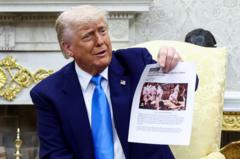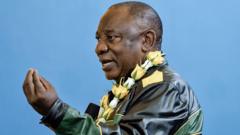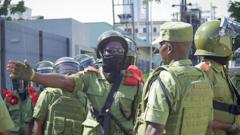President Trump's meeting with South African President Cyril Ramaphosa turned contentious as Trump presented unverified claims of violence against white South Africans. Ramaphosa challenged these assertions, leading to broader discussions about racial issues in South Africa and U.S. immigration policies targeting specific groups.
Tensions Rise Between Trump and Ramaphosa During White House Meeting

Tensions Rise Between Trump and Ramaphosa During White House Meeting
During a controversial meeting, President Trump confronted South Africa's President Cyril Ramaphosa with claims of racial persecution against white South Africans, raising significant questions about the narratives surrounding immigration and crime.
In a significant diplomatic encounter, President Trump and President Cyril Ramaphosa of South Africa found themselves at odds during a White House meeting that has sparked debate over racial issues and immigration policies. In a display that left Ramaphosa visibly shocked, Trump presented a series of videos and printouts alleging severe racial persecution against white South Africans, emphasizing claims of violence with the repetition of the word "death."
The meeting turned fractious as Ramaphosa attempted to contextualize the situation in his country, questioning the locations depicted in the video clips Trump showcased, which he claimed did not reflect South Africa's realities. The encounter was noted not just for Trump's confrontational style, but also as a moment wherein a foreign leader sought to provide a factual perspective to the U.S. president, who appeared to be aligned with fringe theories regarding race and violence.
This incident highlights the ongoing complexities in U.S.-South African relations, particularly as Trump has been vocal about claims of land seizures from white farmers in South Africa, even as he himself has pursued land for his border wall initiative during his first term.
Furthermore, amid these assertions, the Trump administration continues to modify its immigration stance, favoring the acceptance of white South African refugees while simultaneously suspending refugee programs for individuals from other backgrounds facing dire circumstances. This selective approach has raised questions about racial motives underpinning U.S. policies and the administration's treatment of different immigrant groups.
As public opinions and media narratives evolve, the ramifications of this meeting are expected to ripple across international relations and impact domestic immigration discussions. The complexities of race relations in South Africa remain a crucial lens through which these developments are analyzed, especially in a politically charged environment that seems to amplify divisions rather than foster understanding.
With ongoing legal battles surrounding immigration practices—such as recent judicial rulings on deportation protocols—the backdrop of this meeting underscores a critical moment in how the U.S. engages with global issues of race, violence, and human rights.






















